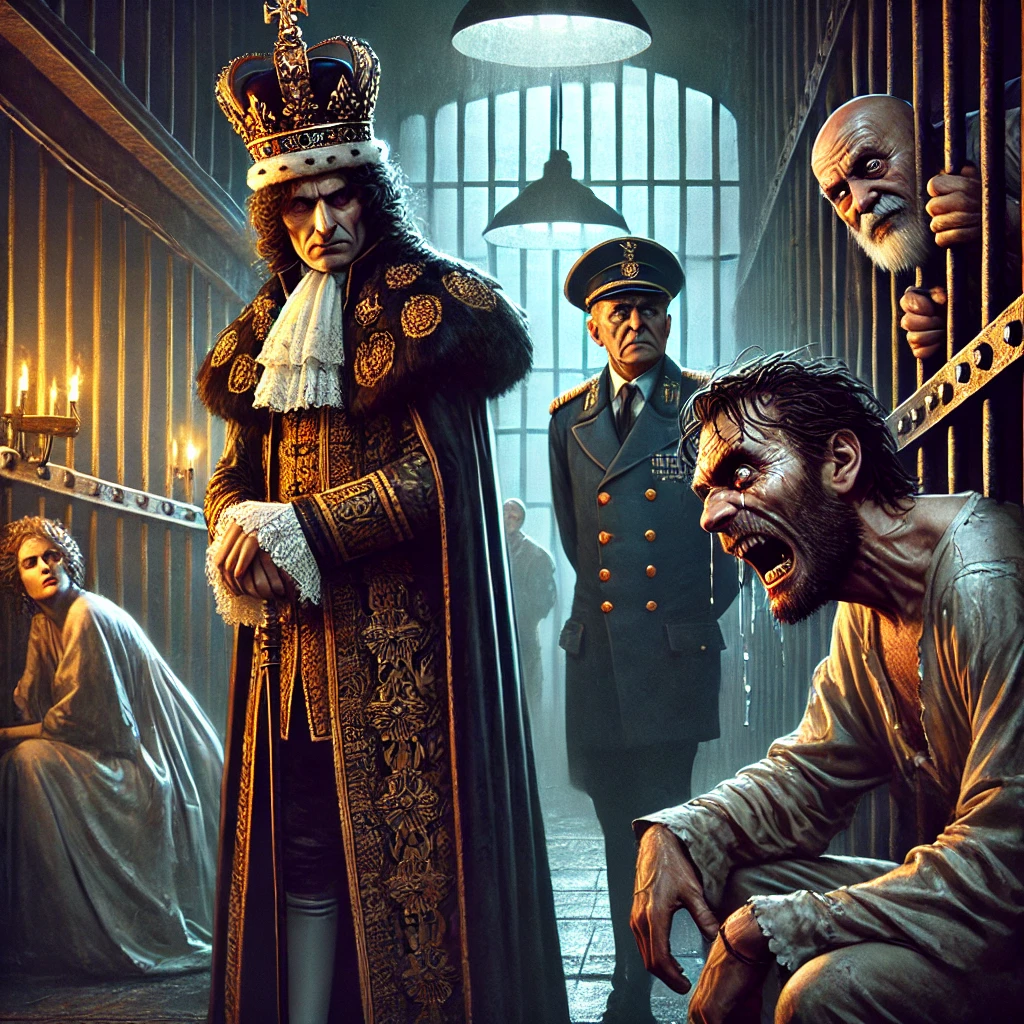It happened once that a monk died. He was a very famous monk, known all over the country. Many people worshipped him and thought he was enlightened. And on the same day a prostitute died. She lived just in front of the monk’s temple. She was also a very famous prostitute, as famous as the monk. They were two polarities living next to each other and they died on the same day.
The angel of death came and took the monk to heaven; other angels of death came and took the prostitute to hell. When the angels reached heaven the doors were closed and the man in charge said, “You have confused them. This monk has to go to hell and the prostitute has to come to heaven.”
The angels said, “What do you mean? This man was a very famous ascetic, continuously meditating and praying. That is why we never inquired, we simply went and fetched him. And the prostitute must already be in hell because the other group of angels took her there. We never thought of asking, it seemed so obvious.”
Said the man who was in charge at the gate: “You are confused because you have looked only at the surface. This monk used to meditate for the benefit of others, but for himself he was always thinking, ‘I am missing life. What a beautiful woman that prostitute is, and available. Any moment I cross the street, she is available. What I am doing is a lot of nonsense — praying, sitting in a buddha posture and attaining nothing.’ But because of his reputation he didn’t dare do it.”
Many people are virtuous because they are cowards like him. He was virtuous because he was a coward — he could not cross the street. So many people knew him, how could he go to the prostitute? What would people say?
Cowards are always afraid of the opinion of others. So he remained an ascetic, fasting, but his mind was always with the prostitute. When there was singing and dancing, he would listen. He sat before the statue of Buddha, but Buddha was not there. He was not worshipping; he would dream he was listening to the sounds of festivities, and in his fantasy he would make love to the prostitute.
And what about the prostitute? She was always repenting, repenting and repenting, She knew she had wasted her life, she had wasted a golden opportunity. And for what? Just for money, selling her body and soul. She always used to look towards the monk’s temple, so jealous of the silent life there. What meditative phenomenon was happening there?
She longed for God to give her one chance to go inside the temple. But she thought, “I am a prostitute, unholy, and I should not enter the temple.” So she used to walk around the temple from the outside, just to look at it from the street. What beauty, what silence, what blessing inside! And when there was KIRTAN and BHAJAN, singing and dancing, she used to wail and cry and scream, imagining what she was missing.
So the man in charge of the gates said, “Bring the prostitute to heaven and take this monk to hell. Their outer life was different and their inner life was different, but like everybody else they both had regrets.”
We in India have invented a word which does not exist in any other language in the world. Heaven and hell are found everywhere; all languages everywhere have words for heaven and hell. We have a different word: it is MOKSHA or NIRVANA or KAIVALYA — the absolute freedom which is neither hell nor heaven.
If your outer life is hell and you repent of it, you will reach heaven, like the prostitute who constantly desired the world of meditation and prayer. And if your outer life is heaven and your inner life is hell, like the monk who desired the prostitute, you will go to hell. But if you make no choice, have no regrets, if you are choiceless, then you will reach moksha.
Choiceless awareness is moksha, absolute freedom. Hell is a bondage; heaven is also a bondage. Heaven may be a beautiful prison; hell may be an ugly prison — but both are prisons. Jesus is in moksha, that is what I say. He is not in heaven; he is not in hell. He is totally free of all imprisonments: good/bad, sin/virtue, morality/immorality. He did not choose. He lived a choiceless life. And that is what I keep on telling you: Live a choiceless life.
But how is a choiceless life possible? It is possible only if you can see the total; otherwise, you will choose.
I have heard that a small boy came home from school very puzzled. His mother asked, “Why do you look so puzzled?”

The boy said, “I am in a muddle. I think my teacher has gone crazy. Yesterday she said that four plus one make five and today she told me three plus two make five. She must have gone mad, because when four plus one is already five, how can three plus two be five?”
The child cannot see that five can come out of many arrangements — there is not only one arrangement which will total five. There can be millions of arrangements in which the total will be five.
Howsoever you arrange your life the religious man will always look to the total and the worldly man will always look to the fragment. That is the difference. The worldly will look to whatever is near, and not see the far hidden there. The distant is not really very far away, it will become the near, it will happen soon. The evening is coming.
Can you have a perspective in which the total life is seen?
It is believed, and I think it is true also, that if a man is drowning, suddenly his whole life, the total, is remembered.
You are dying, drowning in a river, with no time left, and suddenly in your mind’s eye your whole life is revealed from beginning to end. It is as if the whole film passes across the screen of the mind. But what use is it now that you are dying?
A religious man looks at the total every moment. The whole of life is there, and then he acts out of that perspective of the whole. He will never regret as you always do. It is inevitable that whatsoever you do, you will regret it.
One day the king went to visit a madhouse. The superintendent of the madhouse escorted him to every cell. The king was very interested in the phenomenon of madness, he was studying it. Everybody should be interested because it is everybody’s problem. And you need not go to a madhouse: go anywhere and study people’s faces. You are studying in a madhouse!

One man was weeping and crying, hitting his head against the bars. His anguish was so deep, his suffering so penetrating, that the king asked to be told the whole story of how this man went mad. The superintendent said, “This man loved a woman and couldn’t get her, so he went mad.”
Then they passed to another cell. In it there was a man spitting on a picture of a woman.
The king asked, “And what is the story of this man? He also seems to be involved with a woman.”
The superintendent said, “It is the same woman. This man fell in love with her too, and he got her. That is why he went mad.”
If you get what you want, you go mad; if you don’t get what you want you go mad. The total remains the same. Whatsoever you do, you will regret it. A fragment can never be fulfilling. The whole is so big, and the fragment is so small that you cannot deduce the whole from the fragment. And if you depend on the fragment and decide your life accordingly, you will always miss. Your whole life will be wasted.,
You will say this should happen in the morning, that in the evening, and you think that just by changing the arrangement you are changing the total. The total cannot be changed. The total remains the same — everybody’s total remains the same.
Hence I say there is no difference between a beggar and an emperor. In the morning you are an emperor, in the evening you will be a beggar; in the morning you are a beggar, in the evening you will be an emperor. And the total remains the same. Look at the total, BE total, and then all choice drops.
This one mind looks deeply to the very end. It looks from death to birth, it looks from birth to death. Both the polarities are before it. And out of this look, out of this penetrating vision, the action is born. If you ask me what sin is, I will say: Action out of the fragmentary mind is sin. If you ask me what virtue is, I will tell you: Action out of the total mind is virtue. That is why a sinner always has to repent.
Remember your own life, observe it. Whatsoever you do, whatsoever you choose, this or that, everything goes wrong. Whether you get the woman or lose her, in either case you go mad. Whatsoever you choose, you choose misery. Hence Krishnamurti constantly insists on choicelessness.
Osho: The Empty Boat Chapter #5 Chapter title: Three in the Morning (Excerpts)
मिरी अपनी और उस की आरज़ू में फ़र्क़ ये था
मुझे बस वो उसे सारा ज़माना चाहिए था ……………………बुशरा एजाज़
mirī apnī aur us kī aarzū meñ farq ye thā
mujhe bas vo use saarā zamāna chāhiye thā ……………..BUSHRA EJAZ
The song “Chal Sanyasi Mandir Mein” from the film Sanyasi (1975) highlights the inner conflict between desire and renunciation. Authentic spirituality is not about external labels (sanyasi or worldly person) but about inner purity and freedom from desires. Only when one accepts life as it is, without attachment or aversion, can one attain true liberation. Sung by Lata Mangeshkar and Mukesh, Lyricist: Vishweshwar Sharma Music Director: Shankar-Jaikishan.
Dedicating this song to the Legend Manoj Kumar.
(16) Chal Mandir Mein – चल मंदिर में \ (COLOR)HD – Lata Mukesh | Manoj Kumar, Hema Malini – YouTube


I always love the song choice relating to your article 👍🏽
The one and only truth is there is no truth. Life and death have no meaning. Mokh, Nirvana, Realization are concepts to help people who can’t deal with the meaninglessness of existence.
Rajiv bhai, your articles are amazing …it always give a new perspectives, a new dimension
Rajiv
You have amazing writing skills.
vinda
Wonderful story! Totally blown away with the multiple nuances mentioned in it!
Be Choiceless and practice Choicelessness – by observing the total, the whole… Great input to remember and be at peace.
Thanks
Rajivbhai,you have mastered the art of teaching self reflection through powerful story telling.
Thankyou!